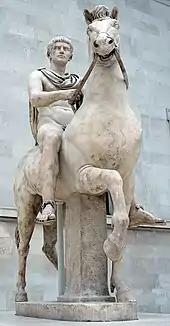
The Transvectio equitum (English: "review of the cavalry") was a parade of the young men (iuventus) of the Roman equestrian class (equites) that took place annually on 15 July. Dionysius of Halicarnassus[1] states that the procession began at the Temple of Mars in Clivo situated along the Via Appia some two kilometers outside the Porta Capena.[2] The procession stopped at the Temple of Castor and Pollux in the Forum Romanum before continuing on to the Temple of Jupiter Optimus Maximus on the Capitoline Hill.[3] The religious rite traced its origins to the battle of Lake Regillus when the Dioscuri gave aid to the Romans during the battle itself.[4]
Other, later, sources indicate that the parade commenced at the temple of Honos.[5] The emperor Augustus revived the ancient ceremony, combining it with a recognitio equitum or probatio equitum in order to scrutinize the character of the equestrians themselves.[6]
Epigraphic evidence indicates that some boys participated in the rite at quite a young age.[7][8] It is likely that a close connection may be drawn between the transvectio equitum and the Lusus Troiae.[7]
A sculpted relief from Como likely depicts the procession.[9]
Sources
References
- ↑ Dion. Hal. Ant. Rom. 6.13
- ↑ Myles McDonnell (3 July 2006). Roman Manliness: "Virtus" and the Roman Republic. Cambridge University Press. pp. 216–. ISBN 978-0-521-82788-1.
- ↑ Liv. 9.46.15 http://latin.packhum.org/loc/914/1/0#483
- ↑ Liv. 2.9 http://latin.packhum.org/loc/914/1/0#69
- ↑ Vir. ill. 32.2
- ↑ The Imperial Civil Service of Rome. CUP Archive. 1910. pp. 49–. GGKEY:6ALZDNKQ32Y.
- 1 2 Zinon Papakonstantinou (13 September 2013). Sport in the Cultures of the Ancient World: New Perspectives. Taylor & Francis. pp. 335–. ISBN 978-1-317-98948-6.
- ↑ ILS 316; CIL 6.3512; CIL 14.3624; CIL 6.31847
- ↑ John Pollini (20 November 2012). From Republic to Empire: Rhetoric, Religion, and Power in the Visual Culture of Ancient Rome. University of Oklahoma Press. pp. 430–. ISBN 978-0-8061-8816-4.